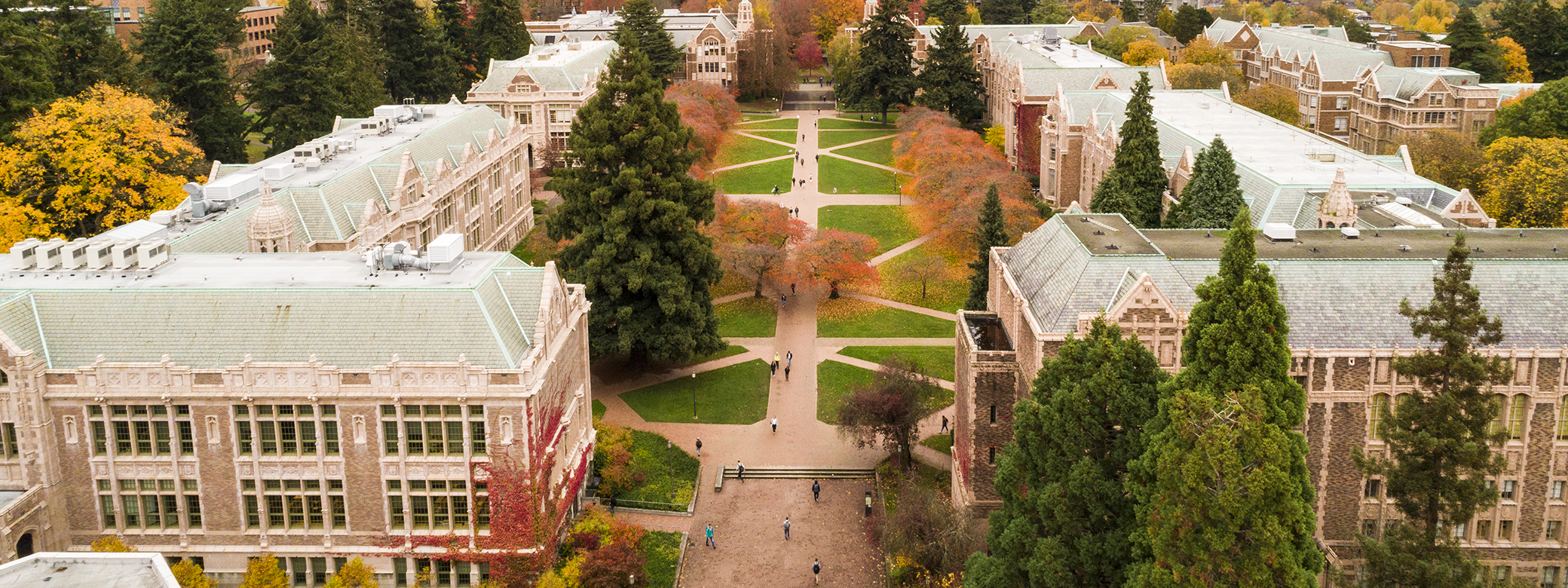The College of Arts & Sciences is pleased to celebrate the many awards and honors that faculty and staff have received over the past few months for their research, leadership, teaching, global impact, and other accomplishments.
- Congratulations to Nobel Prize Winner David Baker
- Holly Barker Named Hanford Hero
- Andrew Laszlo Named Moore Fellow
- Ashleigh Theberge Receives Schmidt Sciences Polymath Honors
- Arts & Sciences Faculty Elected to Washington State Academy of Sciences
- More Awards & Honors
- New Professorship & Chair Appointments
Congratulations to Nobel Prize Winner David Baker

Computational biologist David Baker, professor of biochemistry in the UW School of Medicine, has received the 2024 Nobel Prize in Chemistry for his groundbreaking work in protein design. Baker has ties to the College of Arts & Sciences as an adjunct professor of physics — one of five adjunct appointments — reflecting the interdisciplinary nature of his work. He is the eighth UW faculty Nobel laureate.
Baker is the director of the UW Medicine Institute for Protein Design, whose mission is to create new proteins that solve modern challenges across medicine, technology, and sustainability. He and his team use computing power and artificial intelligence to design entirely new protein structures — what he’s referred to as “the workhorses of all living things” — rather than simply amending existing ones. The applications of this science are endless: defense against viruses, targeting and attacking cancer cells, even combating pollution by breaking down harmful plastics in the environment.
“If you look at David’s work, this is about taking these great basic science ideas and pushing them out so that they make a difference in the world,” says UW President Ana Mari Cauce. “That’s what we are all about, and what we want to be for the state and the world.”
Baker’s co-recipients of the Nobel Prize are Demis Hassabis and John Jumper, artificial intelligence researchers at Google DeepMind.
Holly Barker Named Hanford Hero
The Hanford Hero Award — presented by Hanford Challenge, an NGO — recognizes leaders advocating for nuclear justice related to the Hanford Nuclear Site in southeastern Washington state. This year’s honoree is Holly Barker, teaching professor in the Department of Anthropology and curator for Oceanic & Asian culture at the Burke Museum of Natural History and Culture.
“Holly has been fighting for nuclear justice ever since she was a Peace Corps volunteer in the Marshall Islands in the late 1980s,” shared Liz Mattson, senior program strategist for Hanford Challenge, during the presentation of the award. “She worked for the Republic of the Marshall Islands government and then started teaching. She has lived her life centering frontline communities and fighting for nuclear justice.”

Barker serves as the only non-Marshallese commissioner to the Republic of the Marshall Islands’ National Nuclear Commission, tasked with pursuing nuclear justice on behalf of the Marshallese people. She was named an honorary citizen of the Marshall Islands in 2022 for her work supporting communities impacted by the nuclear legacy.
For Barker, an important part of this work is supporting the training of future Marshallese leaders in the field of nuclear justice. “What is exciting is that this academic year we have three Marshallese students at the UW — a doctoral student and two first-year students — all working with me on nuclear justice,” says Barker. “The work is always about the students, communities, and future.”
Baker’s anthropology courses also frequently highlight nuclear justice. She regularly teaches the course “Surfacing the Stories of Hanford: Local and Global Health Disparities” in collaboration with Hanford Challenge. This year she is offering two new courses, “Popular Culture and Nuclear Coloniality: From SpongeBob to Godzilla” and “Indigenous Art and Nuclear Justice.”
“If you’ve ever been her student, or sat in on one of her classes, you know that Holly is no nonsense when it comes to getting students engaged with the nuclear weapons and waste legacy in our country and world,” Mattson said. “She is one of my favorite co-conspirators for building creative, engaging learning opportunities. She knows how important it is to engage and lift up young people who will be inheriting a contaminated world. She knows how important it is to empower them with information and tools to change that world for the better. And she has fun doing it.”
Andrew Laszlo Named Moore Fellow
Andrew Laszlo, research assistant professor of physics, received a Moore Inventor Fellowship from the Gordon and Betty Moore Foundation. The fellowship champions scientist-inventors who design groundbreaking tools and technologies to advance scientific discovery, environmental conservation, and patient care.

The Foundation noted that Laszlo’s invention of nanopore tweezers presents broad therapeutic potential through a new single-molecule technique, capable of resolving the fundamental steps taken by helicases and polymerases in current drug-screening methods that lack the microscopic detail needed to determine how candidate drugs actually work.
“The Moore Inventor Fellowship celebrates the ingenuity and creativity needed to meet today's challenges and shape a better future,” said Harvey V. Fineberg, president of the Gordon and Betty Moore Foundation. “We are proud to support...visionaries early in their careers as they develop technologies that can make a significant and positive impact on critical issues facing the world and its occupants.”
Laszlo was among five aspiring inventors in the ninth cohort of Moore Inventor Fellows. Each scientist-inventor receives a total of $825,000 over three years to drive their invention forward, which includes $50,000 per year from their home institution as a commitment to these outstanding individuals.
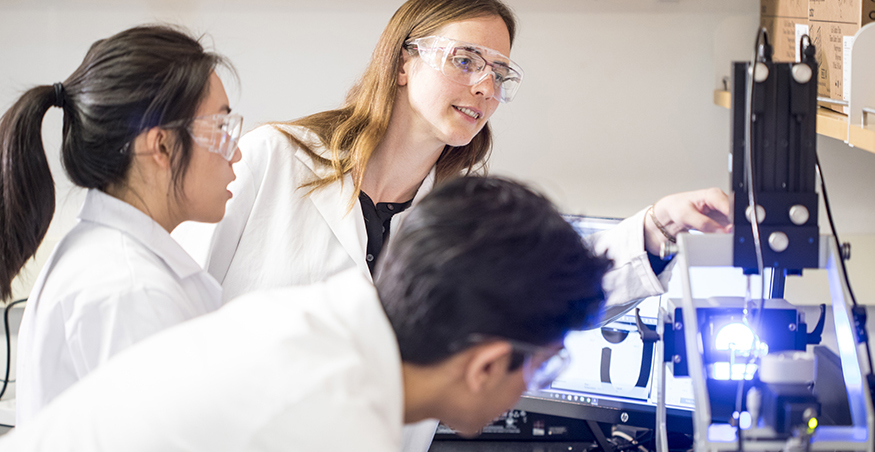
Ashleigh Theberge Receives Schmidt Sciences Polymath Honors
Ashleigh Theberge, professor of chemistry, has been named to the Schmidt Sciences Polymath Program, entitling her to grants of up to $2.5 million over five years to “pursue risky, novel theories that would otherwise be difficult to fund,” according to Schmidt Sciences. She is one of six awardees this year and the first UW faculty member selected for the program, now in its third year.
“The Schmidt Sciences Polymath Program allows bold, creative thinkers to pursue knowledge across boundaries and in doing so, to help all of us better understand the deep interconnections between people, planet, and universe,” says Schmidt Sciences co-founder Wendy Schmidt.
Theberge is co-principal investigator of the UW’s Bioanalytical Chemistry for Medicine and the Environment Laboratory with Erwin Berthier, UW affiliate professor of chemistry. They study the chemical signals that cells use to communicate with one another — research that has numerous applications in medicine, environmental science, and beyond.
The lab’s efforts include developing analytical chemistry tools to advance medicine, such as biomimetic microfluidic systems for integrated cell culture and analysis and at-home sampling tools for diagnostics and environmental monitoring. She has formed dozens of collaborations in other fields, including with clinicians, to investigate how chemical processes are linked to patient symptoms.
“I am very grateful for this funding which will enable us to explore new research directions with the goal of both better understanding molecular mechanisms and improving patient care,” said Theberge, who is also adjunct faculty in the UW Department of Urology.
Read related Perspectives newsletter story about Ashleigh Theberge's research.
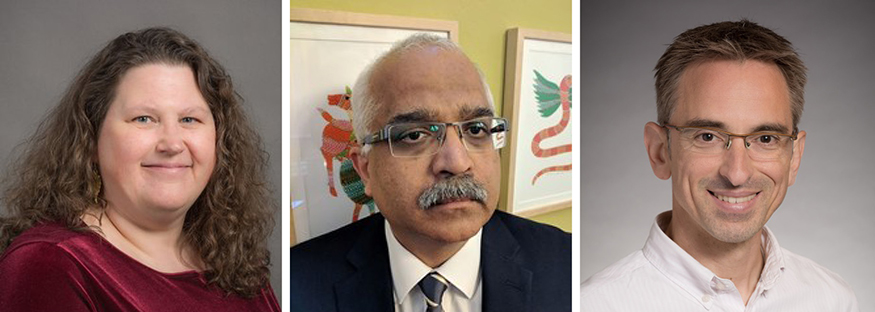
Arts & Sciences Faculty Elected to Washington State Academy of Sciences
Three Arts & Sciences faculty were elected to the Washington State Academy of Sciences in August. Selection recognizes the new members’ “outstanding record of scientific and technical achievement, and their willingness to work on behalf of the academy to bring the best available science to bear on issues within the state of Washington.” They are:
Katherine Comtois, professor of psychiatry and behavioral sciences, adjunct professor of psychology, and director of the Center for Suicide Prevention and Recovery, selected for her “sustained commitment to community-engaged, science-driven practice and policy change related to the prevention of suicide and the promotion of mental health, with a focus on providing effective, sustainable and culturally appropriate care to people with serious mental illness.”
Aseem Prakash, professor of political science and the Walker Family Professor for the Arts and Sciences, a specialist in environmental politics, international political economy, and the politics of nonprofit organizations, noted by the Academy as being “widely recognized as a leader in the field of environmental politics, best known for his path-breaking research on the role firms and nongovernmental organizations can play in promoting more stringent regulatory standards.”
Stefan Stoll, professor of chemistry, selected for “distinguished scientific and community contributions to advancing the field of electron paramagnetic resonance spectroscopy, which have transformed how researchers worldwide analyze data.”
These faculty are among 15 UW professors in the new class of Washington Academy of Sciences members inducted in September.
More Awards & Honors
Eric Adelberger, professor emeritus of physics, has been announced as recipient of the 2025 Einstein Prize from the American Physical Society, for outstanding contributions to experimental gravity using precision torsion-balance measurements, which have profound implications for fundamental physics.
Marie Anchordoguy, professor emerita in the Jackson School of International Studies, is the recipient of a 2024 Foreign Minister’s Commendation from the Ministry of Foreign Affairs of Japan. Anchordoguy, whose work focuses on the political economy of Japan, was acknowledged for her 35-year academic career promoting the research of Japan in the United States. She previously received commendations from the Japan Consul-General for her work promoting understanding of Japan and US-Japan relations.
Mia Bennett, assistant professor of geography, was selected to collaborate on multi-disciplinary research over the next 18 months through the Fulbright Arctic Initiative. The initiative focuses on research and community engagement concerning policy issues in the Arctic region, such as security, energy, and climate change.
Department of Chemistry faculty have had great success with NSF Partnership in Research and Education in Materials (PREM) centers this year. Only 11 full PREMs and 4 seed PREMs were granted nationwide, and four of these will run through National Science Foundation centers based in UW Chemistry. Two PREM awards associated with the NSF Molecular Engineering and Materials Center (MEM-C) at the UW were granted, with the University of Central Florida and the University of Hawai’i at Mānoa as primary awardees of the six-year, $4.2M awards and the UW as a subawardee on each award. In addition, a PREM award went to Fort Lewis College/Norfolk State University and a Seed PREM went to the University of California Merced, both in partnership with the UW’s Science and Technology Center for Integration of Modern Optoelectronic Materials on Demand.
Adrian Dorbra, professor of statistics, received the National Institute of Statistical Sciences (NISS) Distinguished Alumni Award for “his excellent work in Bayesian statistics and multivariate spatiotemporal models, resulting in advancements in public health, demography, and computational social science applied to disease risk assessment.” The award is intended for former NISS postdocs or research associates who have had distinguished careers.
Kai-Mei Fu, Virginia and Prentice Bloedel Professor of Physics and Electrical and Computer Engineering, has been elected a 2024 Fellow of the American Physical Society (APS). APS Fellowship recognizes members for their outstanding efforts to advance physics.
Michael Gelb, professor of chemistry and Boris and Barbara L. Weinstein Endowed Chair in Chemistry, received the 2nd Annual Science Legacy Award from the National MPS Society. Mucopolysaccharidoses (MPS) are a group of rare inherited metabolic diseases; the award recognizes Gelb’s years of work to develop assays to detect lysosomal storage diseases and other rare treatable genetic diseases in newborn screening.
James Gregory, professor of history, received the John Lewis Award for History and Social Justice from the American Historical Society for his work on exclusionary housing practices — work that led to passage of the Covenants Homeownership Account Act in 2023, which provides compensation for victims of racial restrictive covenants and the instruments of housing exclusion and segregation.
Russell Hugo, interim director of the UW Language Learning Center and affiliate assistant professor of linguistics, received the 2024 Continued Distinguished Service Award from the Washington Association for Language Teaching for “contributions to the world language profession [that] have been unflagging and have enjoyed widespread impact."
Kristine Matthews, professor and chair of Visual Communication Design in the School of Art + Art History + Design and founding principal at Studio Matthews, won an SEGD (Society of Experiential Graphic Design) Global Design Award for her sustainably designed exhibition “What Do You Make of This?” in the Jacob Lawrence Gallery. The project is on the Studio Matthews website.
Ted Pietsch, professor emeritus in the School of Aquatic and Fishery Sciences and curator emeritus of ichthyology at the Burke Museum of Natural History and Culture, received the coveted Joseph S. Nelson Lifetime Achievement Award in Ichthyology from the American Society of Ichthyologists and Herpetologists. The award recognizes a member of society for an outstanding body of work in any area of ichthyology and is granted principally on the basis of the quality of the awardee’s research, with consideration also given to the educational impact and service record of the nominee.
Aseem Prakash, professor of political science and the Walker Family Professor for the Arts and Sciences, was awarded the 2024 Excellence in Mentoring Award: Public Policy Section from the American Political Science Association (APSA). “Your exemplary guidance and support have significantly impacted the academic and professional development of numerous students and colleagues, and this award is a testament to your exceptional contributions,” noted the APSA. (Prakash also was elected to the Washington State Academy of Sciences. See story above.)
Adrian Raftery, professor emeritus of statistics and sociology and Blumstein-Jordan Professor Emeritus, was elected a fellow of the International Society of Bayesian Analysis “in recognition of a sustained record of high-impact research in Bayesian methodology and applications in multiple fields, pioneering work in probabilistic forecasting in meteorology and climatology, and major leadership contributions to Bayesian statistics in sociology and allied areas of the social sciences, particularly in demography.”
Lauren Rajakovich, assistant professor of chemistry, received a CSP Functional Genomics Call award from the Joint Genome Institute. The award supports state-of-the-art functional genomics research from researchers who translate genomic information into biological function.
Ariel Rokem, research associate professor of psychology, was awarded the 2024 Education in Neuroimaging Award by the Organization for Human Brain Mapping. The award recognizes individuals who have made significant contributions to education and training in the field of neuroimaging.
Amanda Lock Swarr, professor of gender, women & sexuality studies, received the 2024 Diverse Sexualities Research and Education Institute (DSREI) Book Award for her book “Envisioning African Intersex: Challenging Colonial and Racist Legacies in South African Medicine.” The award committee praised the book as "a thought-provoking discussion of the history of medical colonialism in South Africa [that] forces us to reconsider the assumptions inherent in the medical gaze as well as our ideas about sexuality and gender."
New Professorship & Chair Appointments
Emily Bender, professor of linguistics, was appointed to the Thomas L. and Margo G. Wyckoff Endowed Faculty Fellowship.
Ann Gale, professor of painting and drawing in the School of Art + Art History + Design, was appointed to the Donald E. Petersen Endowed Professorship for Excellence.
Annabelle Gould, professor of visual communication design and director of the School of Art + Art History + Design, was appointed to the Wyckoff Milliman Endowed Chair in Art.
Subhadeep Gupta, professor and chair of physics, was appointed to the Job and Gertrud Tamaki Endowed Chair.
Rachel Heath, professor of economics, was appointed to the Alberta C. Corkery Endowed Chair.
Flint Jamison, associate professor and chair of photo/media + new genres in the School of Art + Art History + Design, was appointed to the Hermine Pruzan Faculty Fellowship.
Charles LaPorte, professor of English, was appointed to the Joff Hanauer Distinguished Professorship in Western Civilization.
Dan Mukulincer, assistant professor of mathematics, was appointed to the Brian and Tiffanie Pang Faculty Fellowship in Mathematics.
Helen O’Toole, professor of painting and drawing and chair of art in the School of Art + Art History + Design, was appointed to the Floyd and Delores Jones Endowed Chair in the Arts.
Ted Poor, associate professor of jazz studies and acting associate director of the School of Music, was appointed to the Ruth Sutton Waters Endowed Professorship in Music.
Sharlene Santana, professor of biology and curator of mammals at the Burke Museum, was appointed to the Walker Endowed Professorship of Natural History.
Anne Searcy, associate professor of music history in the School of Music, was appointed to the Donald E. Petersen Endowed Professorship for Excellence.
Carrie Shaw, artist in resident for voice in the School of Music, was appointed to the Donald E. Petersen Endowed Faculty Fellowship for Excellence.
Marianne Stecher-Hansen, professor of Scandinavian studies, was appointed to the Georg and Nina Pedersen Endowed Professorship for Danish Studies.
More Stories
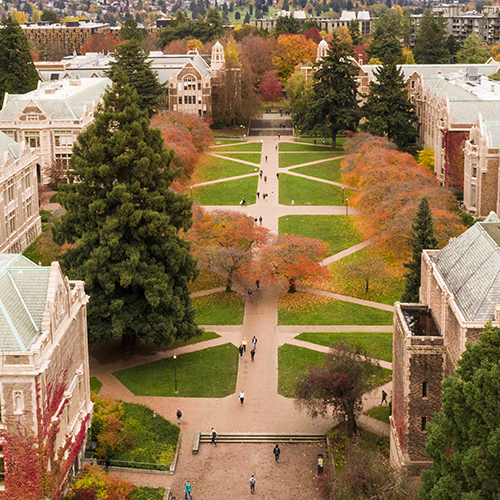
Awards for Research, Social Justice Efforts & More
Recent awards celebrate Arts & Sciences faculty, staff, and alumni for their research, social justice work, lifetime achievements, and more.
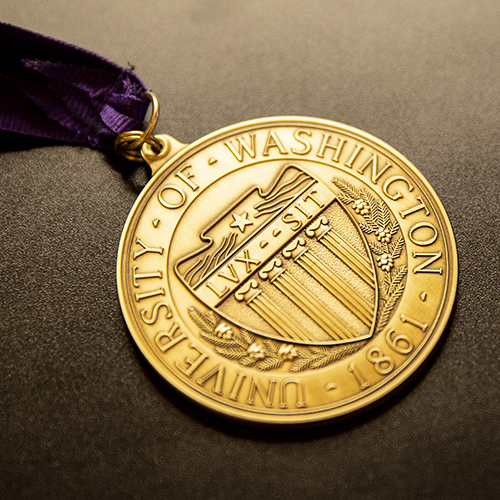
2025 UW Awards of Excellence
Arts & Science faculty and staff were among the recipients of 2025 UW Awards of Excellence for their teaching, leadership, and innovation.
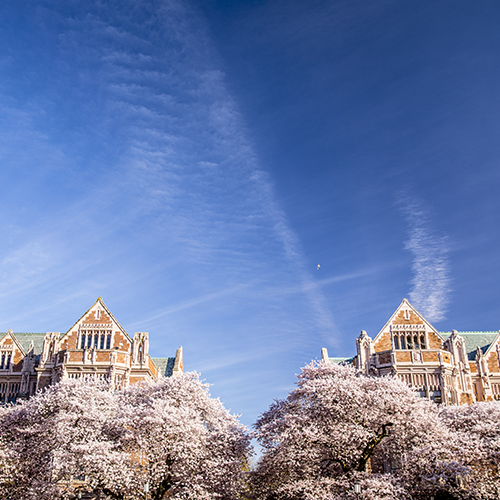
Meet Our 2025 Graduate Medalists
Meet the four graduating students selected by the College of Arts & Sciences as 2025 Graduate Medalists for their accomplishments.
